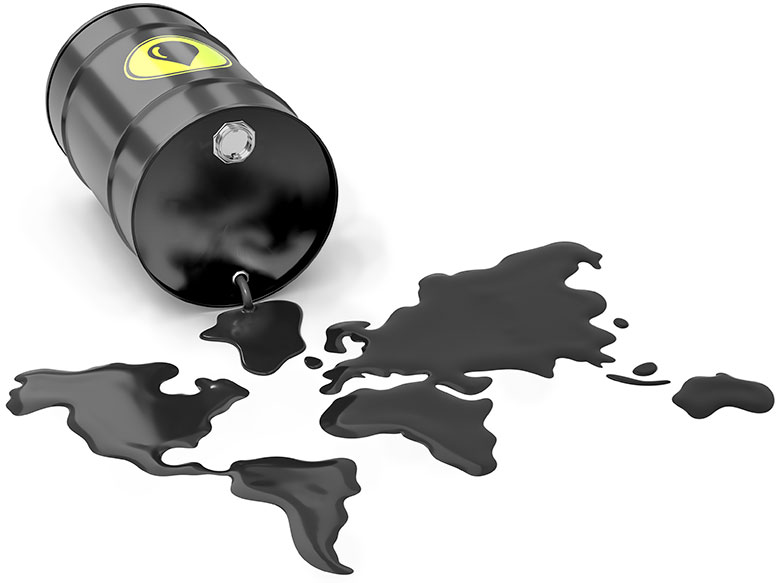Nigeria’s plans to issue a $3.3 billion Eurobond to fund its budget and refinance loans this year will be delayed, after Eurobond yields across emerging markets shot up due to the oil price plunge and the increasing threat of the coronavirus across the globe.
Côte d’Ivoire, Benin and South Africa, which also had plans to issues Eurobonds this year, are similarly likely to postpone any debt issues until markets stabilize.
“When a crisis like this hits, investors will de-risk portfolios and it is much easier for them to pull out of more liquid assets such as Eurobonds,” says Samir Gadio, head, Africa strategy at Standard Chartered.
Events such as these might force the hand of the Nigerian administration to refocus away from oil revenue once and for all
– David Cowan, Citi
As another investment banker says: “At times like this, investors will leave any asset they believe is higher risk.
“This can be irrational: in some cases, people would rather hold US treasuries at completely depressed levels or German bunds at negative interest rates than hold high-yielding African Eurobonds – even when they believe a recovery will happen.”
Yields on Nigeria’s 2031 Eurobond nearly doubled on Friday to 12.1% from 6.8% on February 21 – around the time the spread of the coronavirus throughout Europe came to a head.
Ghana’s 2029 Eurobond saw its yield rise from 6.8% to 10.9% and Angola’s 2029 Eurobond saw yields increase from 7.0% to 14.2% (with a peak at 16.0%) within the same time period.
Oil exporters
Oil exporters will feel the most pressure in Africa, with Angola and Nigeria – sub-Saharan Africa’s two largest exporters – faring the worst.
Both have dwindling levels of foreign-exchange reserves and upcoming debt servicing requirements, which will limit the sovereigns’ ability to put in place fiscal and monetary buffers to cope with the oil price fall.
As of Thursday, dollar reserves at the Banco Nacional de Angola were $16.8 billion and debt servicing costs are approximately $8 billion for this year. In Nigeria, foreign-exchange reserves have fallen 20% this year to £36 billion. The central bank’s limit before it triggers a devaluation of the naira is $30 billion.
|
David Cowan, |
“Angola has an IMF programme in place, which should ensure policy continuity in the fact of the oil price crash, so there is still some hope,” says David Cowan, chief economist for Africa at Citi.
“Events such as these might force the hand of the Nigerian administration to refocus away from oil revenue once and for all,” he says. “There are interesting dynamics at play here – not all reasons to be sceptical.”
However, Adesoji Solanke, director, frontier and sub-Saharan banks equity research at Renaissance Capital, takes a different view.
“Perhaps this is the push that African oil exporters need to meaningfully diversify their economy, but I’m not too sure,” he says.
|
Adesoji Solanke, |
“Time and time again following a crash in the oil price, African countries announce that they will diversify their economic base but materially very little changes. I suspect it might be the same this time around as well.”
Eventually investors will take on more risk when markets stabilize. The trough, however, will be difficult to judge, says Gadio at Standard Chartered, as coronavirus-related risk aversion and its economic impact will need to recede.
“It’s tricky to catch a falling knife, but missing the bottom of the cycle means prices may also rebound rapidly on low liquidity,” he says.
Local capital markets
Given all of the volatility in international bond markets, local capital markets in Africa have remained something of a safe haven, says Stefan Nalletamby, director, financial sector development department at the African Development Bank (AfDB).
| African Domestic Bond Fund vs other funds: Asset class dollar returns, year to date |
||
| Since ADBF inception Sept 18, 2018 | YTD | |
| ADBF | 26.78% | -0.18% |
| EM Local Currency | 12.75% | -1.14% |
| EM Hard Currency | 12.61% | -0.05% |
| African Hard Currency | 11.09% | -6.77% |
| US High Yield | 2.01% | -6.65% |
| US Investment Grade | 20.34% | 4.91% |
| S&P 500 | -2.64% | -14.68% |
| All values till 09.03.2020. Source: Bloomberg | ||
In 2018, the AfDB launched the African Domestic Bond Fund – a pan-African fund that invests in local currency bonds from South Africa, Kenya, Nigeria, Egypt, Namibia, Botswana, Ghana and Zambia – which has held up compared with other funds in recent weeks. Morocco and Mauritius are soon to join the fund.
In 2019, the fund delivered a mark-to-market return of 22% in dollar terms and paid dividends of 11.9% during the same period, says Nalletamby.
Albin Kakou, senior investment officer, AfDB, adds: “Within this current context, we see that African local currency is one of the asset classes to give investors better returns.
“There are, of course, differences between the eight countries tracked, split between oil importers and exporters, which makes this a well-diversified portfolio, reducing country- or region-specific idiosyncratic risks.”
However, as Citi’s Cowan says: “Local African bond markets are generally illiquid, so it is much harder for investors to sell their positions and these markets are much less influenced by international investors – with the exception of Nigeria and Egypt.
“And that’s the point: while local bond markets might look like a good option for investors, international fund managers will remain at arm’s length precisely because these – at times when risk is off – investors want to be able to change their position as quickly and conveniently as possible.”


 Signal2forex.com - Best Forex robots and signals
Signal2forex.com - Best Forex robots and signals




